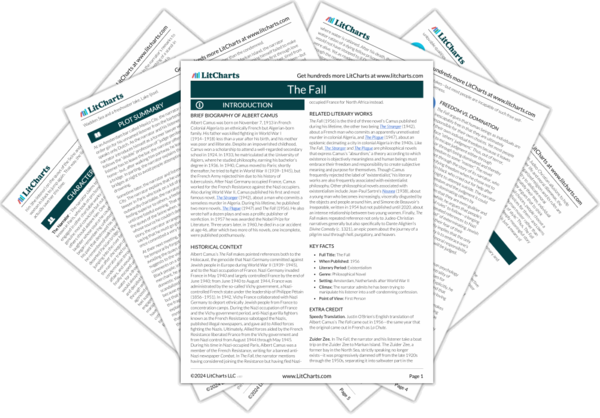The Fall suggests that people tend toward hypocrisy due to their egotism. On the one hand, people’s egotism makes them selfish and thus, in conventional terms, immoral. On the other hand, people’s egotism makes them want to believe that they are moral and good. Moreover, one’s egoism makes one want others to believe in one’s morality and goodness. The conflict between people’s selfishness and their desire to appear good leads them to hypocritically “playact” morality while continuing to behave in self-serving ways. The narrator makes this point to his unnamed listener when they pass a shop sign in Amsterdam bearing “the heads of Negro slaves,” a sign revealing that the shop-owners used to be slave dealers. The narrator argues that most contemporary people (in the 1950s when the novel was published) would profess shock and disgust at such a sign or at literal slavery, yet those same people are willing to countenance de facto slavery “at home or in our factories,” as in the domestic oppression of women or the economic exploitation of the working classes. In other words, the novel argues through its narrator that many people who consider themselves “good” hypocritically put up with or benefit from injustice—and that this hypocrisy makes people “double,” split between their interior selfishness and exterior performance of morality.
Hypocrisy and Inauthenticity ThemeTracker

Hypocrisy and Inauthenticity Quotes in The Fall
Anyone who has considerably meditated on man, by profession or vocation, is led to feel nostalgia for the primates. They at least don’t have any ulterior motives.
Of course, I didn’t tell you my real name.
The feeling of the law, the satisfaction of being right, the joy of self-esteem, cher monsieur, are powerful incentives for keeping us upright or keeping us moving forward.
A very Christian friend of mine admitted that one’s initial feeling on seeing a beggar approach one’s house is unpleasant. Well, with me it was worse: I used to exult.
That’s the way man is, cher monsieur. He has two faces: he can’t love without self-love.
You, for instance, mon cher compatriote, stop and think of what your sign would be. You are silent? Well, you’ll tell me later on. I know mine in any case: a double face, a charming Janus, and above it the motto of the house: “Don’t rely on it.”
I have no more friends; I have nothing but accomplices. To make up for this, their number has increased; they are the whole human race. And within the human race, you first of all. Whoever is at hand is always the first.
To be sure, I knew my failings and regretted them. Yet I continued to forget them with a rather meritorious obstinacy. The prosecution of others, on the contrary, went on constantly in my heart. Of course—does that shock you? Maybe you think it’s not logical? But the question is not to remain logical. The question is to slip through and, above all—yes, above all, the question is to elude judgment.
As I told you, it’s a matter of dodging judgment. Since it is hard to dodge it, tricky to get one’s nature simultaneously admired and excused, they all strive to be rich. Why? Did you ever ask yourself? For power, of course. But especially because wealth shields from immediate judgment, takes you out of the subway crowd to enclose you in a chromium-plated automobile, isolates you in huge protected lawns, Pullmans, first-class cabins.
Then I realized, as a result of delving in my memory, that modesty helped me to sin, humility to conquer, and virtue to oppress.











